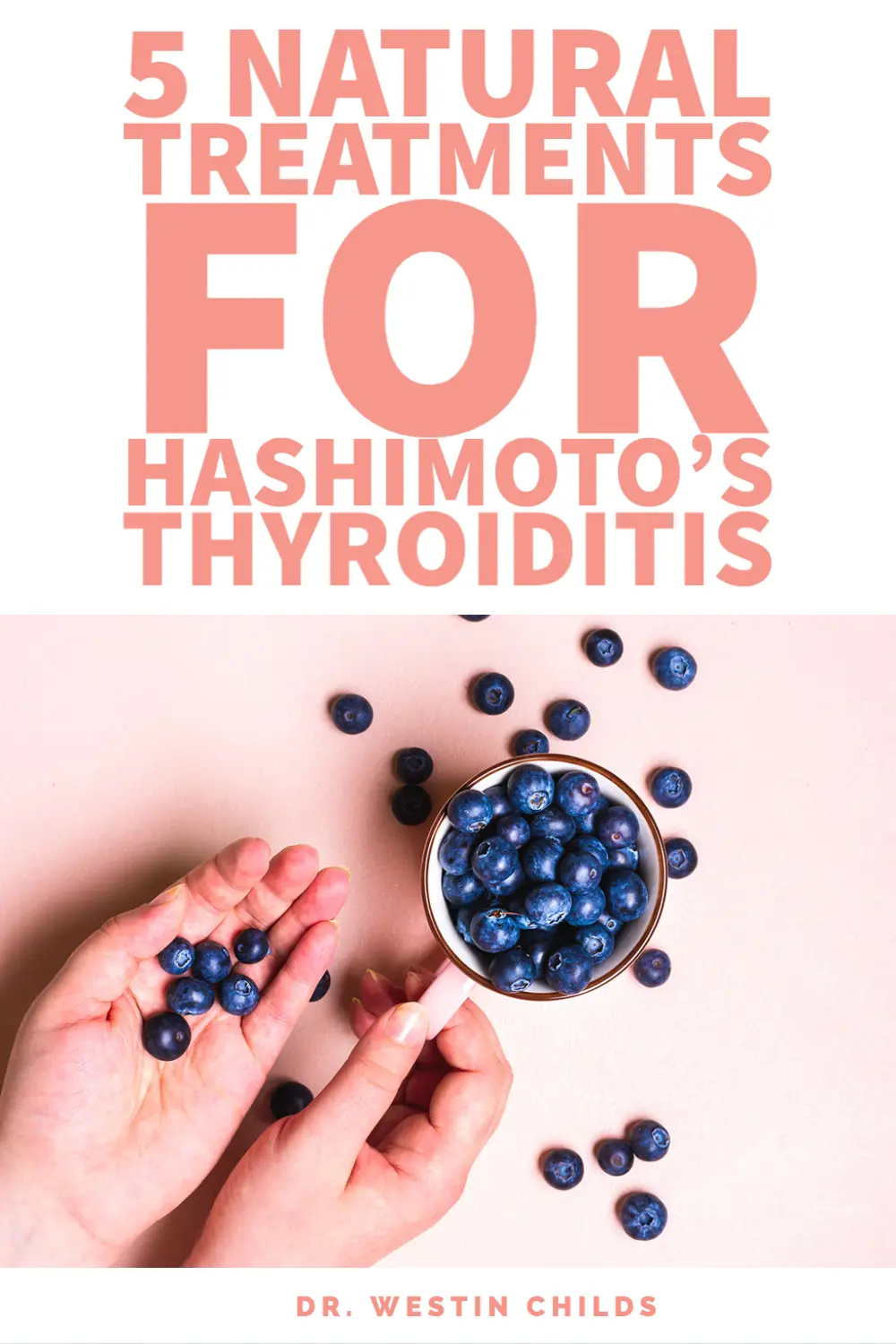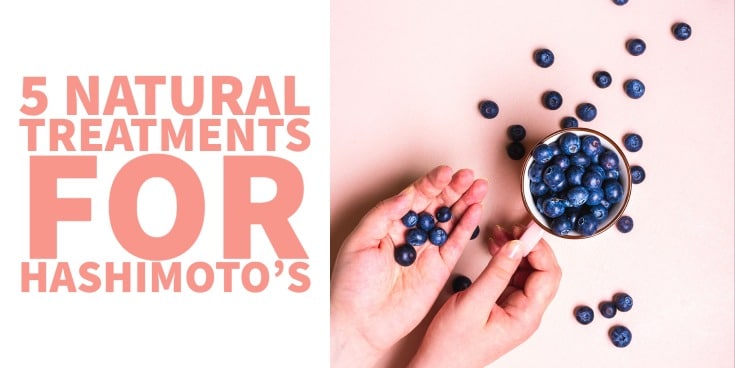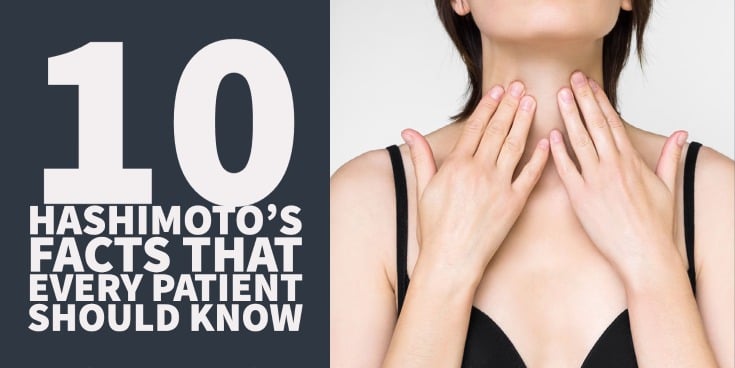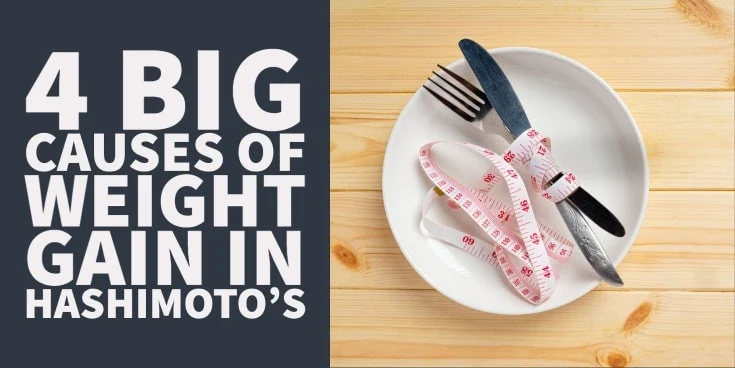Why Treat Hashimoto’s?
Do you have Hashimoto’s thyroiditis?
If so, are you interested in learning how to manage your condition without the use of drugs or thyroid medication?
It might surprise you that this is a possibility for some people who have Hashimoto’s thyroiditis.
Today I am going to walk you through 5 natural treatment options that are available to those people who have this autoimmune disease of the thyroid gland.
But before we get into those you should probably understand one important aspect of Hashimoto’s thyroiditis and why you would want to treat it (besides the obvious reason).
Why is that?
Because you can not count on your doctor to help you with the management of this condition.
Whenever I say this, I often get surprised reactions from patients but it is the truth.
Why?
Because your doctor doesn’t believe that the diagnosis of Hashimoto’s changes the management of your condition.
Remember:
Hashimoto’s causes hypothyroidism or a sluggish thyroid and it is this condition that is treated with thyroid medication.
Hashimoto’s, as an autoimmune disease, does not have treatment as far as doctors are concerned.
Doctors only care about Hashimoto’s insofar as it is a condition that causes low thyroid function.
But that is a big problem for patients.
Why?
Because Hashimoto’s is both a THYROID DISEASE and an IMMUNE disease (it is, after all, an autoimmune disease).
And there are therapies that you can do to manage both of these components naturally.
Wouldn’t you want to improve your thyroid without the use of thyroid medication, if possible?
Wouldn’t you want to reduce the attack of your own immune system on your thyroid gland, if possible?
You would and that is no doubt why you are here.
So let’s jump in:
DOWNLOAD FREE RESOURCES
Foods to Avoid if you Have Thyroid Problems:
I’ve found that these 10 foods cause the most problems for thyroid patients. Learn which foods you should avoid if you have thyroid disease of any type.
The Complete List of Thyroid Lab tests:
The list includes optimal ranges, normal ranges, and the complete list of tests you need to diagnose and manage thyroid disease correctly!
Natural Treatments and Remedies for Hashimoto’s Thyroiditis
Treatments, when it comes to the thyroid gland, are really only helpful if they are available to you.
What I mean is that I can talk about what type and what dose of thyroid medication you should be taking but it doesn’t really matter if your doctor isn’t willing to prescribe that medication to you.
And this is why the therapies we are about to talk about are so valuable.
They do NOT require the prescription of a doctor to utilize!
These therapies are considered natural in the sense that they are available over the counter, they are available to you right now, and they do not require a doctor’s prescription pad.
Does this mean you should do them without a doctor’s supervision?
Well, no, it’s always better to get your doctor on board to help guide you if possible.
But if that isn’t an option, or if your doctor isn’t willing to work with you, then these therapies should be considered!
#1. Diet (3 easy dietary guidelines to start with)
First on the list of any natural treatment guide should be diet.
And I’m not talking about diet in the sense that you should reduce your calories and go on a diet.
I’m talking about a set of healthy guidelines that you use on a day-to-day basis which help dictate which types of foods you consume and which types of foods you avoid.
Why does this matter?
Because the food that you eat can heavily influence both your immune system AND thyroid function.
t turns out that there are several types of foods that can actually make Hashimoto’s worse.
There are even some studies that suggest that certain foods stimulate immune dysfunction in the body (as well as inflammation) and may even be the triggering event for some people.
If you haven’t already, be sure to read my guide on what actually causes or triggers Hashimoto’s so you can ensure that you are on the right treatment!
But back to foods for a second…
The foods that you eat have an impact on your overall health.
And for our purposes, I am going to talk about 3 separate types of diets that can be used and have been shown to be helpful to OTHER people with Hashimoto’s.
What diets am I talking about?
These 3:
- #1. The gluten-free and dairy-free diet
- #2. The elimination diet.
- #3. The AIP diet.
All three of these diets have the potential to help improve your Hashimoto’s and I have them listed here in order of difficulty (from least to most difficult).
If you don’t know anything about dieting for Hashimoto’s then your first diet should be a gluten-free and dairy-free diet.
MANY people with Hashimoto’s do poorly in both of these food groups and we have medical studies showing that gluten and dairy can both potentially cause inflammation n the gut and body.
In addition, we also have studies that show that eliminating dairy (especially milk) in patients with Hashimoto’s can NATURALLY improve thyroid function (1).
I am personally gluten-free and have been for 5 years and I have put many people on this diet with great success.
If you opt to do the gluten-free and dairy-free diet then you need to commit to it 100% for at least 2 months (maybe longer)!
Going gluten-free for 2 weeks and saying it didn’t help you is not going to cut it.
The next diet you may want to try is known as the elimination diet.
The elimination diet helps you remove all foods which are people commonly react to and it includes much more than just gluten and dairy.
The elimination diet is slightly more difficult to follow compared to the gluten-free and dairy-free diets which mean it is also potentially more effective.
If you’ve failed on the gluten-free diet or if you felt somewhat better (but not all the way) then it may be time to up your game and try the elimination diet.
Like the gluten-free diet, you need to make sure that you do it correctly including the re-introduction phase of certain foods.
Lastly, if you are still having trouble after using both the gluten-free diet and the elimination diet, then it might be time to try the AIP diet.
The AIP diet stands for the autoimmune paleo diet or the autoimmune protocol diet and it is the strictest diet available to Hashimoto’s patients (aside from the carnivore diet).
I’m not a huge fan of the AIP diet but I do realize that it has a place in the treatment of Hashimoto’s and I have recommended it and used it with great success in certain patients.
One of the downsides to this diet is that it is hard to follow long-term and while it does help it may cause tolerance to certain foods if you use it for too long.
The AIP diet is ideal for those people with multiple autoimmune conditions and those who are having a really tough time getting their antibodies under control.
#2. Pine bark extract (Pycnogenol).
Next on the list is something known as pycnogenol or pine bark extract (both terms for the same herbal ingredient).
What exactly is pycnogenol?
It’s an herbal extract made of pine bark and it has some very unique properties when taken orally by humans.
What we care about here is that it can both help reduce inflammation and balance your immune system (2).
Also, it’s available over the counter as an oral supplement which means that you can use it with other therapies (including diet) quite easily!
How does pine bark extract work?
It’s a powerful and potent anti-inflammatory agent that helps reduce inflammation in the body.
Inflammation is at the heart of autoimmune disease so anything that reduces inflammation may help reduce the attack of thyroid antibodies on your thyroid gland.
There have been some studies that show that pine bark extract works by inhibiting something known as NF-KB which is a trigger of immune flare-ups in the body.
By downregulating this factor it helps to bring balance to your immune system.
Pine bark extract works well for pretty much any inflammatory condition and many autoimmune conditions but it seems to work particularly well for Hashimoto’s thyroiditis.
I’ve recommended and used it in many patients with great success and have even seen it have antibody-lowering effects.
If you want to use pycnogenol you will want to use between 100mg to 200mg per day (a high dose) for at least 3-6 months.
Make sure you use a high-quality brand like this one.
#3. Vitamin D3 (NOT D2).
Another over-the-counter supplement you should consider using if you have Hashimoto’s is Vitamin D3.
Vitamin D3 is probably closer to a hormone as opposed to a vitamin but regardless of what you call it, it has the potential to help.
Vitamin D plays an important role in regulating immune function (3) and people with low vitamin D levels have a high risk of developing autoimmune diseases (4) of all types.
We also know that people with Vitamin D deficiency tend to have higher rates of depression, fatigue, and even an increased risk of certain cancers.
To make matters worse it’s not like vitamin D deficiency is rare.
On the contrary, there are billions of people in the world who suffer from Vitamin D deficiency.
In my own experience in testing hundreds and hundreds of people I rarely ever see a “normal” vitamin D level unless someone is already supplementing with D3.
Ideally, you should test your Vitamin D level tested prior to supplementing.
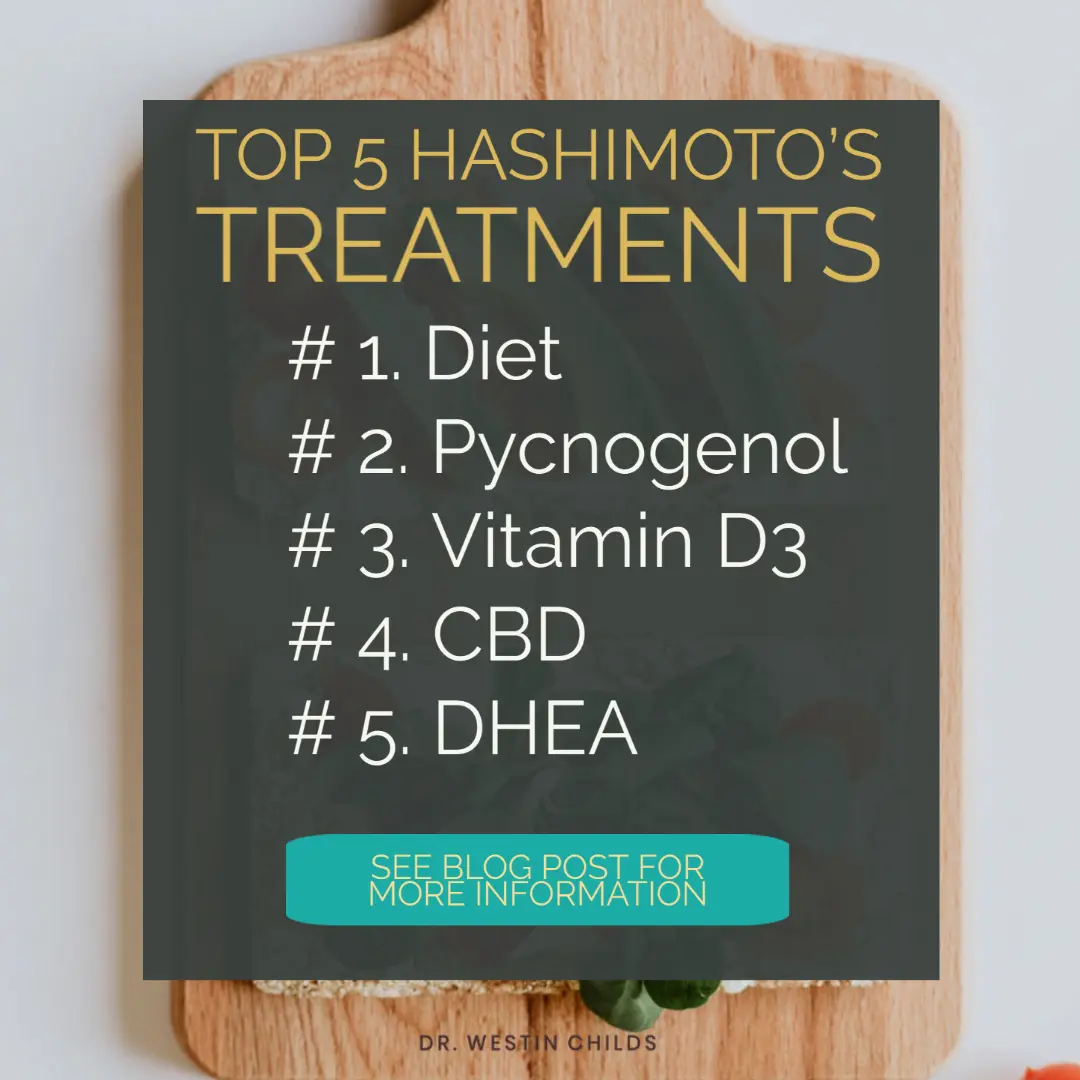
It’s really easy to get tested and you can just ask your doctor to check your vitamin D level during your next set of routine labs.
If you are low (or even low-normal) and you have Hashimoto’s then you will want to supplement.
Using 1,000 to 2,000 IU per day should help bring your level up but you will also want to try and increase your vitamin D naturally with sunlight as well.
So make sure you do both of these things.
Use a high-potency micellized Vitamin D supplement such as this one for absorption.
#4. CBD oil & CBD supplements.
A newcomer to the scene of Hashimoto’s treatment is CBD oil.
CBD oil is relatively new and is now available in MOST states in the US.
I can’t speak for other countries because I am not aware of their laws but you can purchase CBD oil over the counter in most states in the US.
CBD stands for cannabidiol and is not the same thing as THC (another cannabinoid found in marijuana).
CBD can be isolated and concentrated in oil/capsules which provide certain benefits via its effects on the endocannabinoid system in your body.
You don’t need to know all of that but what you should be aware of is that it can help to reduce inflammation and balance your immune system.
And this is why it is effective at treating and managing Hashimoto’s.
I’ve been very impressed with the results of using CBD and I compare it in quality and effectiveness to prescription medications (provided you can find a high-quality product).
CBD can be combined with the other therapies listed here and it can also be used in conjunction with thyroid medication.
This makes CBD oil a great addition to any regimen aimed at treating Hashimoto’s thyroiditis.
#5. DHEA.
Lastly, we have something referred to as DHEA.
DHEA is actually a hormone (an androgen) created predominately by your adrenal glands.
DHEA has some very unique abilities on its own but it’s also a precursor hormone to testosterone and estrogen in the cholesterol-hormone metabolism pathway.
DHEA stands for Dehydroepiandrosterone which is why I usually refer to it as DHEA!
As I mentioned previously, DHEA is an androgen which means it stimulates androgen receptors (the same receptors that testosterone triggers) in the body.
We know that people with low testosterone levels have a higher risk of developing an autoimmune disease compared to those with normal testosterone levels.
This is why women get more autoimmune diseases compared to men (They have lower testosterone levels)!
DHEA is also considered a “youthful” hormone meaning that it is thought to be responsible for helping you maintain a youthful appearance (both physically and physiologically).
So why would you want to use DHEA?
Well, first off, you wouldn’t want to use DHEA unless you are sure that you have low DHEA levels.
And you can check your blood levels for serum DHEA-S.
If you find that you are low AND if you have Hashimoto’s THEN you may want to consider supplementing with this hormone.
Note: be sure to also check testosterone (you don’t want to use DHEA if your testosterone is high).
DHEA, much like testosterone, may help balance the immune system and reduce thyroid gland damage.
It’s not a universal cure but it can and does help certain individuals who have low levels of androgens in their bodies.
DHEA also helps to improve metabolism and youthful levels of DHEA are probably one of the reasons why younger people don’t have issues with weight (like older people).
Using DHEA may not only help your Hashimoto’s and thyroid but may also help with your weight!
You need to be careful using DHEA, though, because it can be converted into either estrogen or testosterone (5).
This is why you really don’t want to use it if your testosterone or DHEA levels are already high.
This problem can be avoided if you use a low dose of DHEA (don’t overdose on DHEA!).
I recommend using between 5 and 10 mg per day at most.
You can use a supplement such as this one.
Start with 1 capsule per day (5mg) and increase to two if necessary.
Your Next Steps:
Okay, after reading this, what sort of things should you be doing?
My recommendation is that you start with at least ONE of these therapies listed above.
And that first step should always be diet (if you haven’t already).
If you’ve managed your diet then your next steps should be the easy-to-get over-the-counter supplements.
Don’t be afraid to use more than one of these therapies all at once.
And, before you ask, yes they can be used with your thyroid medication (just don’t take them at the same time as your medication).
If possible, it would be a good idea for you to check your thyroid antibodies BEFORE you start these therapies.
Why?
Because then you can check your antibodies after a few months to see what kind of improvement you were able to get with these therapies.
And remember:
These are only a fraction of the total available therapies to treat Hashimoto’s.
I just wanted to provide you with some easy therapies that can be used over the counter but we didn’t include ANY of the prescription medication options that exist such as thyroid medication and LDN.
But now I want to hear from you:
Are you currently suffering from Hashimoto’s thyroiditis?
Have you tried ANY of these therapies in the past?
Did they work for you? If so, leave your experience below!
If not, tell me which one you will be trying next!
Keep the conversation going and leave your questions or comments below!
